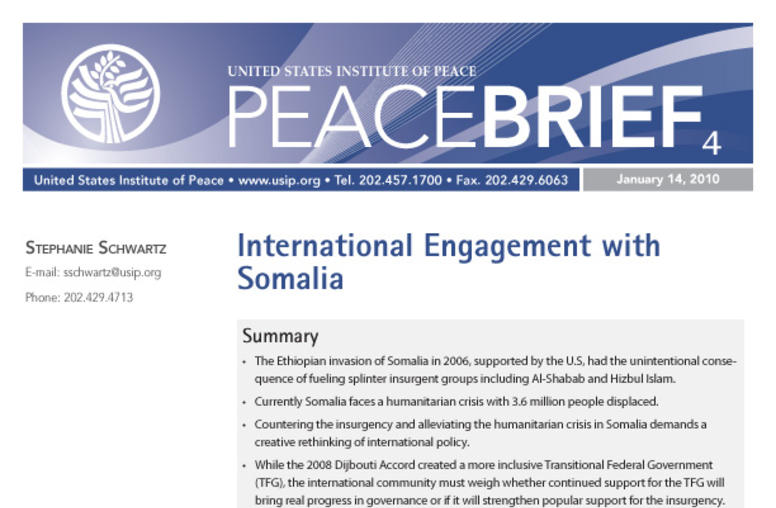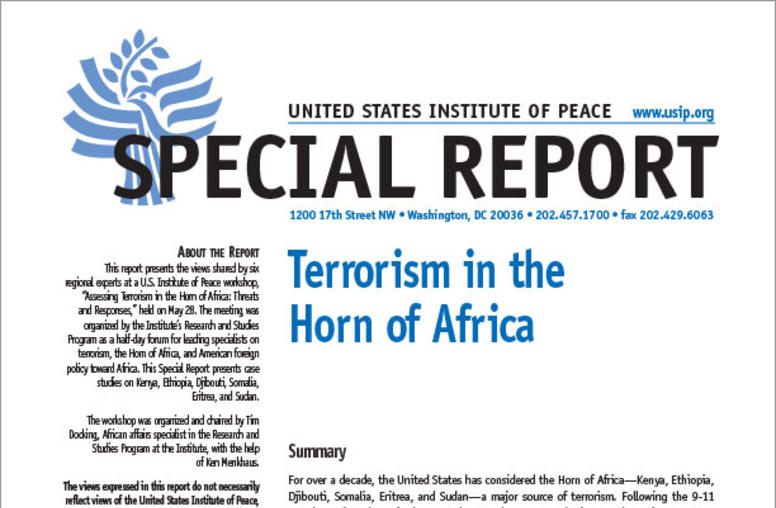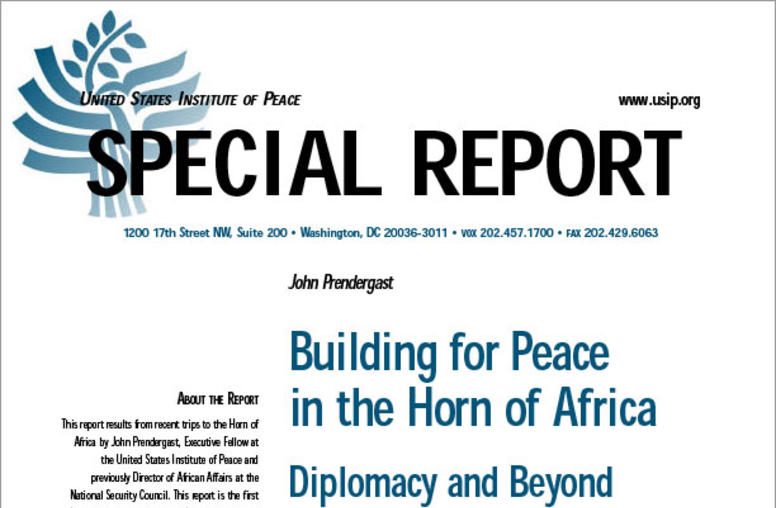Publications
Articles, publications, books, tools and multimedia features from the U.S. Institute of Peace provide the latest news, analysis, research findings, practitioner guides and reports, all related to the conflict zones and issues that are at the center of the Institute’s work to prevent and reduce violent conflict.

International Engagement with Somalia
The United States Institute of Peace held a public event in December 2009 to examine how current international policy is affecting the situation in Somalia, and how different policy approaches could promote better governance and help to stabilize this highly volatile situation.
Counting the Costs of Somali Piracy
Authored by USIP's Raymond Gilpin, this new working paper offers practical strategies to mitigate the rising costs of Somali piracy and lay the foundation for lasting peace. The upsurge in attacks by Somali pirates between 2005 and mid-2009 reflects decades of political unrest, maritime lawlessness and severe economic decline which has dire implications for economic development and political stability in Somalia.
On the Issues: Somalia
Raymond Gilpin, Associate Vice President and director of USIP’s Sustainable Economies Center of Innovation, talked about this new development, factors fueling Somali piracy, and offers policy options to address the problem.
On the Issues: Somalia
David Smock is interviewed on Ethiopia's invasion of Somalia, and event that thrusted Somalia back into the international spotlight.
How to Respond to Somalia's Current Crisis
The current crisis in Somalia is much more complicated than simply a conflict between Islamic extremists and moderates. U.S. policy toward Somalia must be more all-encompassing.

Political Islam in Sub-Saharan Africa: The Need for a New Research and Diplomatic Agenda
Summary An understanding of the multifaceted nature of political Islam on the African subcontinent is a precondition for the formulation of an effective U.S. policy toward the region. Such a formulation would place political Islam in a historical and contemporary context. In East Africa, discrimination against Muslims—which began in colonial mission schools and continued in education and employment following independence—played an important role in the development of political Islam...
Somalia: Ten Years Later
Years of negotiations marked by bickering among various Somali factions have produced little. Recently hope has emerged that an agreement to create a national Somali government might be in sight. What are the prospects for peace?

Terrorism in the Horn of Africa
Summary For over a decade, the United States has considered the Horn of Africa—Kenya, Ethiopia, Djibouti, Somalia, Eritrea, and Sudan—a major source of terrorism. Following the 9-11 attacks against the United States, the Horn has come under increased scrutiny as a strategic focal point in the war against terrorism. In May 2003, the Kenyan government admitted that a key member of the al Qaeda terror network was plotting an attack on western targets, confirming al Qaeda's firm local ...
Peace Agreements: Somalia
Addis Ababa Agreement concluded at the first session of the Conference on National Reconciliation in Somalia, 27 March 1993 (03-27-1993) Posted by USIP Library on: March 20, 2002 Source Name: The United Nations and Somalia 1992-1996, the United Nations Blue Books Series, vol. VIII. (New York: United Nations, Dept. of Public Information, 1996), pp. 264-266. Date digitized: November 4, 2000 Agreement on the establishment of an ad hoc committee, signed in Addis Ababa, on 15 January 199...

Building for Peace in the Horn of Africa: Diplomacy and Beyond
Summary Already the deadliest conflict cluster in the world, the Horn of Africa has exploded again because of the intensification of the once-improbable Ethiopia-Eritrea war. Support by Ethiopia and Eritrea for proxy militias in Somalia has reignited the Somali civil war and threatened the south with renewed famine.